Dan Riley's Blog, page 4
August 13, 2020
On Hiatus, Week 4
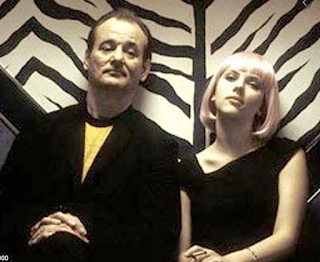 Beast and The Beauty
Beast and The BeautyI recently laughed my way through "What About Bob?"...again. But it was also an uncomfortable reminder that I once dismissed Bill Murray in a blog post as "our most overrated comic actor". Since Murray appears in three of my all time favorite comedy films...Bob...Groundhog Day and Tootsie, I had to ask myself what prompted me to dismiss him like that. Through deep self analysis, I concluded it must have been residual miffedness about him being paired romantically with Scarlett Johannson in Lost in Translation ...a film I love not because of Bill Murray, but in spite of him. Only in Harvey Weinstein World could they proffer a legitimate attraction of a sex goddess like Scarlett for the pock-marked, pulpy face of an old shoe like Murray...which would be like making a romance between Tracy Ullman and Ryan Gosling if gender bias didn't exist. Anyway, I felt the need to correct that earlier post...and so this week's detour in the Way Back Machine takes us here.
Published on August 13, 2020 09:40
August 7, 2020
On Hiatus, Week 3
Published on August 07, 2020 11:07
Hiatus, Week 3
Published on August 07, 2020 11:07
July 31, 2020
On Hiatus, Week 2

Since fascism happened here in a big and quite overt way this week, seems like a good time to direct some eyeballs in the way of this two-year old Nob post.
Published on July 31, 2020 18:15
July 25, 2020
On Hiatus
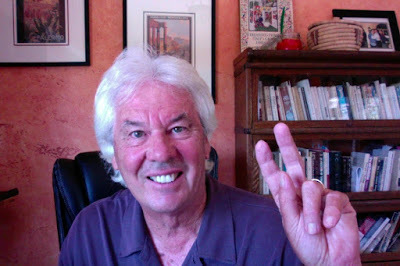 To victory in the months to come...victory over the Coronavirus
To victory in the months to come...victory over the Coronavirus and victory over our novel civic virus
The Nobby Works is going on hiatus for an indefinite period of time. Meanwhile I'll repost old Nobs that I think worth a second look by those who may have already read them...or a first look by those who came late to the party. And since it's always best to start with an origin story, I lead off with this ONE.
Published on July 25, 2020 14:27
July 19, 2020
Book Ends
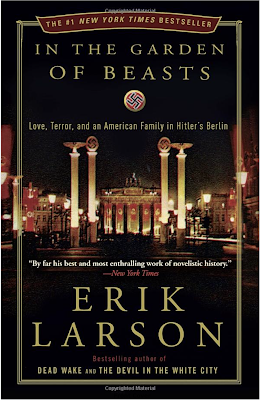
I understand that the book du jour is Mary Trump’s Too Much and Never Enough: How My Family Created the World's Most Dangerous Man, and if I care a whit about keeping The Nob au courant that’s the book I’d be blogging about this week…but it’s not. It’s not that I have any issue with her book. Quite the contrary. I’m grateful that a trained clinician has finally brought an in-depth psychological analysis to the Narcissist-in-Chief. As I’ve written in past posts, Trump’s psychiatric dysfunction overrides even the most serious questions about his chaotic politics or gross incompetence. Everything about him stems from a severe, unmistakable case of Narcissistic Personality Disorder (NPD, and I’m glad that Mary Trump has chosen to address that professionally. Hopefully this very important part of her book will garner as much attention as the mashed potatoes dumped on Trump’s head. The book that gets my attention for this post, however, is a nearly decade-old book about another of the world’s most extreme and dangerous narcissists…Adolph Hitler. At the risk of breaking Godwin’s Law against cavalierly invoking Nazi comparisons, let me say up front that I’m not saying Trump is Hitler. Trump totally lacks Hitler’s focus, energy, and coherence. What they share, though, is NPD, which comes in all shapes and sizes, but has one common core thread…the subordination of all other people and things to the raw id of the NPD sufferer. In the Garden of Beasts by Erik Larson, the book I’m talking about here (and thanks to son-in law Niels Froelicher for recommending it) is not only linked to Mary Trump’s book by dueling portraits of dangerous men with NPD. Both authors also devote considerable attention to the people and conditions that allow manifestly dangerous men to gain control over masses of others. Larson’s book focuses on the family of William E. Dodd, the US ambassador to Germany during Hitler’s consolidation of power. It draws heavily on the copious letters and diary entries of Dodd and his daughter Martha. I’m ashamed here to admit that until I read this book, I knew absolutely nothing about Dodd and his family. Upon finishing it, however, I’ve concluded that the Dodds may be the quintessential American family. They were the living, breathing embodiment of the pastel version of the American family found in popular culture…Jimmy Stewart-like, slightly muddled, paragon of patriotic virtues dads; quietly intuitive, always supportive Donna Reedish wives; lovable, though somewhat wild kids…Beavers, Dobies, Dennis the Menaces one and all. But the Dodds didn’t act out on a soundstage set of bucolic suburbia. They were thrust into Berlin as it was barreling toward Babylonian horror. It is totally in keeping with their American innocents abroad personae that when they first arrived in Germany they were alternately beguiled and tolerant of what they saw of imminent Nazisism.Dodd, a college professor, was FDR’s bottom-of-the barrel pick for the post. Dodd's hero was Thomas Jefferson; he admired Woodrow Wilson, who he knew personally; and his life long ambition was to capture the nobility of the old South in a definitive history. He routinely referred to Nazi treatment of Jews as its “Jewish problem”. In a lame attempt to get Germans to ease up on their (pre-oven) restrictions, he assured them that other nations of the world, including the US, also had a Jewish problem. There were other, less offensive ways of dealing with it, he vainly argued. All of this, of course, would’ve gotten Dodd banned from most social media sites today and made him a pariah, if not unemployable, in academia.Daughter Martha, who at 24 followed her father to Germany to escape an unsatisfactory marriage, wrote glowingly about the good cheer, optimism, and blonde beautifulness wrought by Hitler’s revolution. She was such a fan of Hitler that at one point an elite German, a mutual connection between Martha and Hitler, facilitated a meeting between them believing that an American lover might be just what the chancellor needed to burnish his image and temper his behavior. Martha, a notorious mens’ girl, was game but came away largely unimpressed with Hitler, except for his piercing eyes. Martha was promiscuous in both body and mind. During her time in Berlin she juggled relationships with a French diplomat, a Gestapo chief, and a Russian spy. Her James Bond-like sexual appetite was matched by an intellectual dilettantism that took her from Nazi sympathizer to Soviet spy with insatiable aspirations to the literati all under an comfortable patina of Babbittry. Like America itself, the Dodds were not irredeemable. As close friends and associates—and in Martha’s case, lovers—fell increasingly to Nazi brutality, the scales dropped from their eyes. They became less inclined to believe that there was a limit to how bad things could get or that the awfulness they were witnessing all around them was merely a bump in the road on the way to a fascist utopia. Martha, as was her fickle nature, went all in to embrace communism, petitioning Stalin to let her marry her Russian lover. Dodd himself tried valiantly to make America see what was happening no longer as Germany’s Jewish problem but as the Jews’ German problem only to be met with cold resistance from FDR and his administration. The American power structure didn't want to do anything that might jeopardize Germany’s repayment of US loans. In this it laid the the moral framework for the modern Republican Party in its willingness to tolerate any abomination for a price. And Dodd was like Hillary Clinton, a flawed but sure Cassandra, raising warnings of catastrophe fated to fall on deaf or dumb ears. What In the Garden of Beasts reveals is that dangerous men rise to power because other men…and women…don’t take them seriously enough. They lack the imagination to see how far a dangerous man will go. They trust that norms and institutions will keep such men in check and believe that mere human conscience is a fair match for a feral id. In short they don’t know shit about how to deal with narcissistic personality disorder, and the world pays a price…over and over again.Now for a word from our sponsor: Now Playing Black Panther
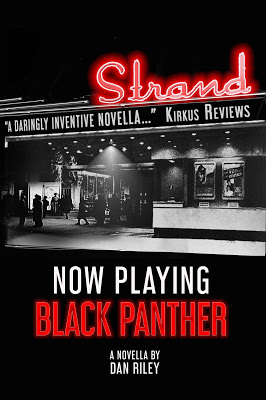
Published on July 19, 2020 12:16
July 11, 2020
The WARPING of America

Immediately there fell from his eyes something like scales, and he received his sight at once…--Acts 9:18
My first experience with having scales fall from my eyes came at the teaching of my early mentor, Robert Campbell. It was Bob who introduced me to the work of philosopher Bertrand Russell, whose scathing attacks on the hero of my political youth John F. Kennedy included Russell’s assessment that JFK was "more dangerous than Hitler". I had written an essay for Mr. Campbell’s journalism class that was laudatory of JFK’s handling of the Cuban Missile Crisis. As was Bob’s MO as a teacher, he wanted to expose me to different points of view…and Russell’s description of Kennedy’s behavior during the crisis as “reckless” was surely different than anything I had encountered anywhere in the world around me. That may have caused the scales to drop somewhat from my eyes, but it did not stop the tears from flowing from those same eyes a year later when JFK was assassinated. Still my early idolatry of the New England Irish Catholic boy who grew up to be president was tempered for life. It wasn’t until decades later when I immersed myself in the White House tapes made during the crisis for a book I was writing that I achieved a mature, balanced view of John F. Kennedy that exists comfortably for me beyond boyhood hero worship and school boy iconoclasm. That experience has prepared me well, I think, for bearing witness to the willful, sometimes wild, national reassessment currently going on regarding the pantheon of American heroes…all male…all white…all dead. I exclude from this consideration the “heroes” of the Confederacy. They were and always have been traitors and got passed on as heroes through a hallucinogenic mix of racism, nostalgia, and romanticization of rebellion. Tearing down their statues and reassigning their legacies should be an easy call. The warping of America, as I call it, concerns the Worthiness Adjustment of Reputable People…the Washingtons, the Jeffersons, the Lincolns, FDRs and JFKs of our history…Founding Fathers and war leaders and martyrs. Every one of them with damning flaws in their personal character or political behavior…or both. Recognizing these flaws should not be all that difficult. After all, these are human beings we’re talking about, not gods. But there’s the rub, as the Immortal Bard (who pretty much abandoned his family for most of his life) might say. Those who want to pull these giants of American history off their pedestals do not want to allow for human failings; those who want to perpetrate their lofty positions into perpetuity want to treat them like gods. The battle currently being waged over these legacies is in the hands of zealots on both sides. In the case of Jefferson, for instance, one side considers the taint of slaveholding enough to throw him out of the national pantheon on his ass; the other side wants to continue the historic whitewashing that turned his phrasemaking of all men are created equal into a grotesque get out of jail free card. In a recent Nob post I wrote about Jefferson’s contemporary Mary Old who freed her slave as soon as she received her as a gift. On the one hand the incident proves that not everyone in Jefferson’s time and place accepted slavery. On the other hand, it raises the question: Who did more to spread the idea of equality throughout the world…Mary Old with her singular good act or Jefferson with his soaring phrasemaking? I recently came upon this tweet on Twitter:

My response to the good professor was that rather than mock his students' self proclaimed virtue that he ask them as follow up how it is that they, mere college students, would have been more enlightened than worthies of the past. Such a self-examination may have revealed more to them about themselves and their country's past and present than a sucker question like the one he did ask.The naïveté, ignorance and outright mythmaking that led us to inflate the reputations of our nation's notables in the first place is now being answered by naïveté, ignorance and outright mythmaking in tearing them down. The recent attack on a Ulysses S. Grant statue in San Francisco on the grounds that he owned a slave is Exhibit A as to why the WARPing of any historical individual should not be made in the emotions of the moment and by people who learned everything they know about American history on social media. U.S. Grant, of course, did as much as any American to end slavery. What we’re going through now is not really a test of these men of the past; it’s a test of ourselves. Are we grown up enough as a country to accept that those who helped shape us and defend us and push us forward were imperfect people? Are we mature enough to both honor and critique our Founding Fathers as we do our real fathers…and mothers? Are we fair enough to balance a man’s achievements against his failings and arrive at a true measure rather than a politically correct one? With all else that’s going on these days, this test is still monumental. If in this coming November election we give ourselves the do-over we so desperately need, we’ll face major questions about how we want to move forward on health, the economy, corruption, and accountability. We’ll also face a major question about how we want to treat our past…as children who only want to hear what they want to hear…or as adults who can handle the truth.
Time a word from our Corporate Overlord: Now Playing Black Panther

Published on July 11, 2020 22:46
July 2, 2020
Between the Black Death and Us
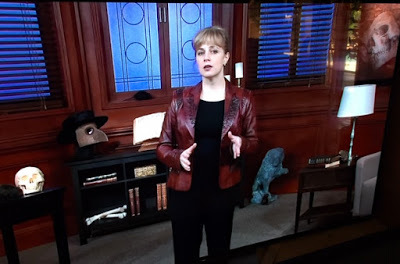 Prof. Dorsey Armstrong bringing the Black Death home
Prof. Dorsey Armstrong bringing the Black Death homeAt the beginning of this thing, I posted a listing of what I thought were good viewing options for those looking for new things to watch during the pandemic. Since posting that list, I’ve come upon a Must-See new option. It’s called The Black Death, the World’s Most Devastating Plague. It’s probably a show we wouldn't ever have watched had the current crisis not so immersed us in the pathology of disease…and Amazon Prime* probably would not have recommended it for us. So just when it seems the world is falling apart all around us, serendipity still manages to rear its little bobblehead.To say the show is hosted by Professor Dorsey Armstrong, Medieval scholar at Purdue University, is an understatement. She is the show. She roams deliberately before the camera over a donnish set, weaving a compelling narrative of the Black Plague bolstered by scholarship and presentation skills, aided occasionally by graphics of line drawings, paintings, animated maps and pull quotes. This is an old school college lecture, where video razzmatazz and high tech computer tricks take a back seat to erudition and oral tradition. It’s among the best college courses I’ve ever experienced, which is why half way through its two-dozen 30-minute lectures my head is exploding.It’s not just the history of the Black Plague that’s so riveting, it’s the echoes of it in our battle against Covid-19. One would think the show was purposely designed to draw parallels between 1348 and 2020, but the show was put together in 2016, which makes the comparisons between then and now even more eerie based on happenstance alone. Generally speaking the links consist of failure of political leadership, economic devastation, overwhelming of care capabilities, and civic unrest. Travel is restricted from plague-designated areas. There is the inevitable scapegoating of “others”-–during the Plague it was the Jews, rather than the Chinese now…or old people or brown people.
Most fascinating of all is that with all the death and devastation the Plague wrought, it also brought with it fundamental and one might say progressive changes. With the rich and clergy being wiped out in comparable numbers, it served to lessen their mystical hold on the lower classes. With mass deaths at all levels of society, it created significant gaps in the labor force. But because peasants existed in such greater proportional numbers they were able to survive and in doing so realize freedoms they hadn't been able to before. Mainly they were no longer tethered to the manors they'd lived and worked on for generations and could take their labor elsewhere. Moreover they were now able to make wage demands rather than just take what they were given. One can imagine how much easier the Fight for 15 is going to become in the months ahead in our own time.
On the opposite end of the coincidence spectrum, even back then the Swedes marched to the beat of their own drum…continuing to gather in homes of the sick and for funerals. Which, speaking of funerals, reminds me: Lorna and I have taken to watching the lectures during lunch, a sometimes un-appetizing ordeal. During one viewing we were eating lasagna when Dr. Armstrong described burial in mass graves as a single layer of bodies covered with a layer of dirt, covered with another layer of bodies, covered with another layer of dirt…like a lasagna, she said. Gag me with a spoon!Despite the widely held view that the Plague years saw depressing acts of abandonment of diseased family and friends as well as cruelty against diseased strangers, there are stories of remarkable bravery and sacrifice. In Norway, an Icelandic sailor came down with the Plague before his ship set sail back to Iceland. The ship’s captain and crew decided to stay behind in plague-ravaged Norway rather than carry it home with them--an act of courage that spared Iceland from the Black Death for another half century. In another instance, the Black Death came to Florence in the person of a sick seaman who arrived at the door of a friend seeking refuge. In granting it, this Florentine Good Samaritan doomed his city to lose 80% of its population in 1348. The rapaciousness of the Plague, however, strongly suggests that if not that particular sailor, another Patient Zero would have been close behind.That sailor was a refugee from the city of Caffa (present day Ukrainian territory). In 1266 Genoa had negotiated rights to the port city with a Mongol Kahn to facilitate trade between the two. But new Mongol leadership a century later wanted the city and laid siege to it. While encamped on the outskirts, the Mongols were attacked by rats bearing the plague and started dying off. In a stratagem worthy of Game of Thrones, the Mongols started catapulting diseased cadavers of their comrades over the walls of Caffa, thus infecting the Genoese traders in one of history's first recorded acts of biological warfare. The Italians escaped on their ships, but only to take the Plague with them to Italy, and from there to greater Europe. Those who do not learn the lessons of history are doomed to repeat it has become such a cliche that its meaning has just about been lost (if not outright challenged...). In this series, Dorsey Armstrong serves the lesson up to us in very palatable, bite-sized portions and leaves it to us to gag on it or not.
* The first 9 lectures are available for free from Prime; the rest are available through a paid Great Courses membership, but that also offers a 7-day free trial...so if you binge...or cram as we used to call it college, you can get through them all at no cost.
Now a word from our Corporate Overlord: Now Playing Black Panther

Published on July 02, 2020 14:26
June 24, 2020
Morals Most Foul
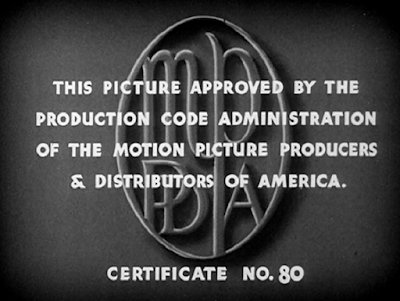
During a recent cloudy afternoon in front of TCM, Lorna and I enjoyed an Edward G. Robinson film that had escaped our attention. The irony of it was that the film, Woman in the Window, so paralleled one of our classic favorites, Scarlet Street. Like Woman in the Window, Scarlet Street was directed by Fritz Lang, both films co-starred Joan Bennett and Dan Duryea in addition to Robinson, and both entailed Robinson playing a milquetoast man who falls under the spell of a femme fatale. In both, the Robinson character is driven to murder. In Scarlet Street, he is haunted by his crime. However, in Woman in the Window the filmmakers relied on one of the oldest tricks in the book (though probably not so old in 1944) in order to conform to the reigning movie code of the time which prohibited anyone from getting away with murder—to wit, they turned most of the movie into an extended dream sequence so that Robinson’s character awakes from a nap still innocent.
That got me thinking: What would happen to certain modern classics if they had to go by a code dictating that no one gets away with murder? So, here goes*…
THE GODFATHER
Connie and Kay run out. Connie opens the door to the Don's office. Michael's sitting at his desk with Neri behind him. Kay follows
CONNIE
Michael! You lousy bastard you killed my husband! You waited until Papa died so nobody could stop you, and then you killed him. You blamed him for Sonny. You always did. Everybody did. But you never thought about me. You never gave a damn about me. Now what am I going to do?
KAY Connie...
CONNIE
(to Kay, after Kay puts her arms around her) Why do you think he kept Carlo at the mall? All the time he knew he was gonna kill'im. (to Michael)
And you stood Godfather to our baby you lousy cold-hearted bastard. Want to know how many men he had killed with Carlo? Read the papers – read the papers! (after she picks up and slams down a newspaper)
That's your husband! That's your husband!
Connie goes toward Michael. Neri holds her back until Michael motions it's okay.
MICHAEL
(taking Connie's arms as she cries) Come on...
CONNIE
(struggling out of Michael's arms) No! No! No!
MICHAEL (to Neri) Get her upstairs. Get her a doctor.
Neri takes Connie out of the room. Michael sighs, then lights a cigarette.
MICHAEL (to Kay) She's hysterical. Hysterical.
KAY Michael, is it true?
MICHAEL
Don't ask me about my business, Kay...
KAY
Is it true?
MICHAEL
Don't ask me about my business...
KAYNo.
MICHAEL
(as he slams his hand on the desk) Enough! (then) Alright. This one time Michael points his finger...this one time I'll let you ask me about my affairs...
KAY (whispering) Is it true? Is it?
MICHAEL
(quietly, shaking his head)No.
KAY
(after a sigh of relief and Michael kisses and hugs her) I guess we both need a drink, huh?
Kay leaves the room to fix Michael a drink. At the same time, Rocco, Clemenza, and Neri enter the office. Clemenza shakes Michael's hand. Kay turns her head to watch them. They embrace Michael, then kiss his hand.
CLEMENZA
(kissing Michael's hand) Don Corleone...
Rocco kisses Michael's hand as Neri shuts the door blocking Kay's view.
THE BARKay stands motionless over the bottles and glasses, then turns and looks at the door that’s just been shut on her.
HER POVClosed door
BARKay reaches for a phone sitting on the bar, picks it up, and dials 0.
KAY
(into phone)Get me the police, please. END THE PLAYER
CELIA
Griffin, it's Larry Levy's office. He says it's very important.
GRIFFIN Give it a minute, then transfer it to the car phone.
Griffin’s Rolls Royce drives along. The phone RINGS. He answers.
Griffin Yeah?
SANDY’S VOICEI have Larry Levy on the line.
GRIFFINHow did the screening go? How's my new ending?
LARRY Fantastic! Worked like gangbusters. That's why you get the big bucks.
GRIFFIN Yeah. Stop kissing my ass. What do you want? Can't this wait?
LARRY I don't think it should. This is hot. You should hear this writer's pitch. It’s a great idea.
GRIFFIN
Who's the writer?
LARRYI'll put him on the speaker. Hold on.
WRITER Hi, Griff. Remember me? I'm the asshole who was in the postcard business.
GRIFFIN
You!
WRITERThe king of suspense. You remember.
GRIFFINI haven't heard from you for a while.
WRITER I've been busy writing a script. I got inspired.
LARRY
Give him the pitch. You'll love this, Griff. It's great!
WRITER
All right. It's a Hollywood story, a real thriller. It's about a shit-bag producer, studio exec... who murders a writer he thinks is harassing him. The problem is, he kills the wrong writer. Now he's got to deal with blackmail and the cops. But, here's the switch. The son of a bitch gets away with it.
GRIFFINLarry, get off the speaker. I want to talk to him privately.
LARRYSure. This is a winner.
GRIFFIN
He gets away with it?
WRITERAbsolutely. It’s a Hollywood ending. He marries the dead writer's girl and they live happily ever after.
GRIFFIN
Can you guarantee that ending?
WRITERIf the price is right, you got it.
GRIFFIN Guarantee that ending, you got a deal.
WRITER
I guarantee it, Griff.
GRIFFINWhat do you call this thing?
WRITERThe Player.
GRIFFIN
The Player. I like that.
EXTERIOR: GRIFFIN’S NEW HOUSE DAYGriffin pulls into his Brentwood estate, a garden of flowers, a perfect home. JUNE, eight months pregnant, comes out to greet him as he gets out of his Rolls.
JUNEWhat took you so long?
GRIFFIN
Traffic was a…
The sound of police SIREN harshly interrupts. Griffin turns to look down his well-manicured street as dread washes over his face. ENDCHINATOWNEvelyn holds the gun. She's shaking but apparently in control of herself. Gittes rises to his feet. Mulvihill starts to help Cross up.
EVELYN
No, don't help him. Don't do anything.
Mulvihill doesn't move. Cross rises on his own. Evelyn holds the revolver on him.
EVELYN
She's gone. It's no good.
CROSS
Where?
GITTES
(moving to Evelyn)
Let me handle that.
EVELYN
(to Gittes)
I'm all right.
GITTES
(she's not)
Sure, but I'd like to handle it.
Evelyn backs up as her father takes a step toward her.
CROSS
You're going to have to kill me, Evelyn. Either that or tell me where she is.
Evelyn is backing up. Cross moving on her. Evelyn cocks the pistol.
CROSS
How many years have I got? She's mine too.
EVELYN
She's never going to know that.
There's the SOUND of a SIREN. Cross lunges toward her. Gittes grabs Cross.
Duffy and Walsh are elbowing through the crowd. Gittes sees them.
GITTES
Duffy, go over and sit on Mulvihill.
(to Walsh)
Jesus Christ, I didn't tell you to bring the police department with you.
WALSH
Jake, it's Chinatown. They're all over the place. You oughta know better.
GITTES
(to Walsh, indicating Cross)
Gimme your keys. Watch this old fart, will you?(moving to Evelyn)
Take Duffy's car. Curly's boat's in Pedro, near the Starkist cannery. It's the Evening Star. He'll be waiting. I'll take care of this.
She looks to Gittes. He looks at her. She turns and he looks at her. She turns and Escobar is standing between her and it.
ESCOBAR
Mrs. Mulwray, you don't want to run around like that.
GITTES
Oh, Christ. Escobar, you don't know what's going on. Let her go. I'll explain it later.
ESCOBAR
Mrs. Mulwray, it's a very serious offense pointing that at an officer of the law. It's a felony.
GITTES
Let her go. She didn't kill anybody.
ESCOBAR
(starting toward her)
I'm sorry, Mrs. Mulwray.
GITTES
Lou, she will kill you. Let her go for now. You don't know.
ESCOBAR
Gittes, stay outta this.
Escobar continues to move toward her. Gittes grabs him.
GITTES
(to Evelyn)
Now take off.
Evelyn gets in the car. She starts it. Gittes lets Escobar go.
ESCOBAR
I'll just have her followed. She's not going anywhere.
There's a single GUNSHOT. Both men look surprised. Down the block a uniformed officer has fired, standing beside his double-parked car. Duffy's sedan slows to a stop in the middle of the street. It jerks a couple of times, still in gear, then comes to a halt.
Gittes rushes to the car. He opens it. Evelyn falls out, inert. Blood is pouring from her right eye.
GITTES
(yelling)
No!
He holds onto Evelyn as Escobar and others hurry up. Cross himself elbows through.
GITTES
Where is he? I'll kill him, I'll kill the son of a bitch.
Several officers contain Gittes.
GITTES
(to Escobar)
Who is he? Get his name. I'll kill him.
ESCOBAR
(badly shaken)
Take it easy, take it easy, it was an accident.
GITTES
An accident?
Gittes looks down. What he sees horrifies him. Cross is on the ground, holding Evelyn's body, crying.
GITTES
Get him away from her. He's responsible for everything. Get him away from her!
ESCOBAR
(stunned)
Jake, you're very disturbed. You're crazy. That's her father.
Walsh and Duffy elbow through the crowd.
ESCOBAR
(to them)
You wanna do your partner the biggest favor of his life? Take him home. Just get him the hell out of here!
Duffy bear hugs the protesting Gittes, along with Walsh, literally dragging him away from the scene, with Gittes trying to shake free.
WALSH
Forget it, Jake. It's Chinatown.
Jake finally shakes free.
GITTESFuck that!
He grabs a gun out of Walsh’s coat and runs toward Cross.
WALSH
Jake!
Cross looks up from Evelyn's body just in time to take a bullet square to the head.
THE END
The USUAL SUSPECTS
EXT. SIDEWALK Verbal limps his way carefully across the sidewalk, avoiding people as best as he can. He looks over his shoulder, getting farther away from the police station. He can see Rabin and the cop on the steps, looking around with strange, lost expressions on their faces. He does not notice the car creeping along the curb beside him.
INT. CAR DRIVER'S P.O.V. The driver's hands tap the wheel patiently. His eyes follow Verbal as he fumbles through the crowd.
EXT. SIDEWALK Kujan pushes and shoves, looking this way and that.
EXT. STREET LOW ANGLE on the feet of dozens of people. Verbal's feet emerge from the crowd on the far side. They hobble along the curb. SUDDENLY, the right foot seems to relax a little, the inward angle straightens itself out in a few paces and the limp ceases as though the leg has grown another inch.
CRANE UP VERBAL'S BODY Verbal's hands are rummaging around in his pockets. The good left hand comes up with a pack of cigarettes, the bad right hand comes up with a lighter. The right hand flexes with all the grace and coordination of a sculptor's, flicking the clasp on the antique lighter with the thumb, striking the flint with the index finger. It is a fluid motion, somewhat showy. Verbal lights a cigarette and smiles to himself. He turns and sees the car running alongside.
INT. DISPATCHER'S OFFICE Jack Beer pulls the sheet out of the fax machine and turns it over, revealing the composite sketch of KEYSER SOZE. Though crude and distorted, one cannot help but notice how much it looks like VERBAL KINT.
EXT. STREET The car stops. The driver gets out. IT IS KOBAYASHI, or the man we have come to know as such. He smiles to Verbal. Verbal steps off of the curb, returning the smile as he opens the passenger door and gets in. The man called Kobayashi gets in the driver's seat.
A moment later, Agent David Kujan of U.S. Customs wanders into the frame, looking around much in the way a child would when lost at the circus. He takes no notice of the car pulling out into traffic and he steps in front of it. He’s knocked to the ground, but quickly springs back up on his feet. He leans into the window and comes eye to eye with Verbal again, only this time he knows who he’s really looking at. Kujan steps back and unholsters his gun with a triumphant smile.
END
NO COUNTRY FOR OLD MEN
INT. BELL'S KITCHEN - DAY
Loretta pours Sheriff Bell and then herself morning coffee.
BELLMaybe I'll go ridin’.
LORETTAOkay.
BELLWhat do you think?
LORETTAI can't plan your day.
BELLI mean, would you care to join me?
LORETTALord no. I'm not retired.
A beat. Sheriff Bell sips his coffee.
BELLMaybe I'll help here then.
A beat. Loretta takes a sip.
LORETTABetter not.
They both sip.
LORETTA--How'd you sleep?
BELLI don't know. Had dreams.
LORETTAWell you got time for 'em now. Anything interesting?
BELLInteresting…scary as hell more like it. There was a dude goin’ ‘round…a monster really… and he was killin’ people with a cattle stun gun.
LORETTAHmm…sheriff hangs up his guns and starts dreaming of stun guns. Sounds like someone’s got some unresolved retirement issues.
He tilts his cup to her.
BELLAnton. His name was Anton. I never knew any Anton.
LORETTAChekhov?
BELLWho?
She gives him a nonplussed look, then turns to exit with her coffee
LORETTAEnjoy the ride.
THE END
* After reading this post, dear friend Gary Popovich challenged me to "now do Deliverance." I responded that I already had and that exchange prompted me to re-read my Deliverance post...and now I'm here to tell you I wouldn't change a word of the novel, the movie, or my own essay.
Published on June 24, 2020 07:17
June 19, 2020
Political Correctness, The Early Days
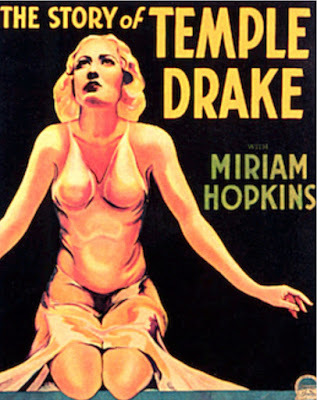 The outrage over this 1933 film based on a William Faulkner novel
The outrage over this 1933 film based on a William Faulkner novel gave impetus to the Hays Code because it contained a rape
scene, giving birth to a nation of unanswered questions:
Does a film showing rape promote rape?
Does a film showing murder promote murder?
Does a film showing racism promote racism?
As the rightful anger over the killing of unarmed black people by police becomes a predicate for implicating an 80-year old movie*, it seems a good time to look back at one of the most noteworthy acts of political correctness in American history...the Hays Code that dictated what could and could not be shown on motion picture screens. Revisiting the code should be an uncomfortable experience for both sides of the PC debate in our time…for surely many who object to PC now would’ve applauded the code then, and many who advocate for PC now would’ve have opposed it then. Which only goes to show…you never can tell:
The Motion Picture Production Code of 1930 (Hays Code)
If motion pictures present stories that will affect lives for the better, they can become the most powerful force for the improvement of mankind
A Code to Govern the Making of Talking, Synchronized and Silent Motion Pictures. Formulated and formally adopted by The Association of Motion Picture Producers, Inc. and The Motion Picture Producers and Distributors of America, Inc. in March 1930.
Motion picture producers recognize the high trust and confidence which have been placed in them by the people of the world and which have made motion pictures a universal form of entertainment.They recognize their responsibility to the public because of this trust and because entertainment and art are important influences in the life of a nation.Hence, though regarding motion pictures primarily as entertainment without any explicit purpose of teaching or propaganda, they know that the motion picture within its own field of entertainment may be directly responsible for spiritual or moral progress, for higher types of social life, and for much correct thinking.During the rapid transition from silent to talking pictures they have realized the necessity and the opportunity of subscribing to a Code to govern the production of talking pictures and of re-acknowledging this responsibility. On their part, they ask from the public and from public leaders a sympathetic understanding of their purposes and problems and a spirit of cooperation that will allow them the freedom and opportunity necessary to bring the motion picture to a still higher level of wholesome entertainment for all the people.General Principles1. No picture shall be produced that will lower the moral standards of those who see it. Hence the sympathy of the audience should never be thrown to the side of crime, wrongdoing, evil or sin.2. Correct standards of life, subject only to the requirements of drama and entertainment, shall be presented.3. Law, natural or human, shall not be ridiculed, nor shall sympathy be created for its violation.Particular ApplicationsI. Crimes Against the Law
These shall never be presented in such a way as to throw sympathy with the crime as against law and justice or to inspire others with a desire for imitation.1. Murder a. The technique of murder must be presented in a way that will not inspire imitation. b. Brutal killings are not to be presented in detail. c. Revenge in modern times shall not be justified.2. Methods of Crime should not be explicitly presented. a. Theft, robbery, safe-cracking, and dynamiting of trains, mines, buildings, etc., should not be detailed in method. b. Arson must subject to the same safeguards. c. The use of firearms should be restricted to the essentials. d. Methods of smuggling should not be presented.3. Illegal drug traffic must never be presented.4. The use of liquor in American life, when not required by the plot or for proper characterization, will not be shown.II. Sex
The sanctity of the institution of marriage and the home shall be upheld. Pictures shall not infer that low forms of sex relationship are the accepted or common thing.1. Adultery, sometimes necessary plot material, must not be explicitly treated, or justified, or presented attractively.2. Scenes of Passion a. They should not be introduced when not essential to the plot. b. Excessive and lustful kissing, lustful embraces, suggestive postures and gestures, are not to be shown. c. In general passion should so be treated that these scenes do not stimulate the lower and baser element.3. Seduction or Rape a. They should never be more than suggested, and only when essential for the plot, and even then never shown by explicit method. b. They are never the proper subject for comedy.4. Sex perversion or any inference to it is forbidden.5. White slavery shall not be treated.6. Miscegenation (sex relationships between the white and black races) is forbidden.7. Sex hygiene and venereal diseases are not subjects for motion pictures.8. Scenes of actual child birth, in fact or in silhouette, are never to be presented.9. Children's sex organs are never to be exposed.III. Vulgarity
The treatment of low, disgusting, unpleasant, though not necessarily evil, subjects should always be subject to the dictates of good taste and a regard for the sensibilities of the audience.IV. Obscenity
Obscenity in word, gesture, reference, song, joke, or by suggestion (even when likely to be understood only by part of the audience) is forbidden.V. Profanity
Pointed profanity (this includes the words, God, Lord, Jesus, Christ - unless used reverently - Hell, S.O.B., damn, Gawd), or every other profane or vulgar expression however used, is forbidden.VI. Costume
1. Complete nudity is never permitted. This includes nudity in fact or in silhouette, or any lecherous or licentious notice thereof by other characters in the picture.2. Undressing scenes should be avoided, and never used save where essential to the plot.3. Indecent or undue exposure is forbidden.4. Dancing or costumes intended to permit undue exposure or indecent movements in the dance are forbidden.VII. Dances
1. Dances suggesting or representing sexual actions or indecent passions are forbidden.2. Dances which emphasize indecent movements are to be regarded as obscene.VIII. Religion
1. No film or episode may throw ridicule on any religious faith.2. Ministers of religion in their character as ministers of religion should not be used as comic characters or as villains.3. Ceremonies of any definite religion should be carefully and respectfully handled.IX. Locations
The treatment of bedrooms must be governed by good taste and delicacy.X. National Feelings
1. The use of the Flag shall be consistently respectful.2. The history, institutions, prominent people and citizenry of other nations shall be represented fairly.XI. Titles
Salacious, indecent, or obscene titles shall not be used.XII. Repellent Subjects
The following subjects must be treated within the careful limits of good taste:
1. Actual hangings or electrocutions as legal punishments for crime.
2. Third degree methods.
3. Brutality and possible gruesomeness.
4. Branding of people or animals.
5. Apparent cruelty to children or animals.
6. The sale of women, or a woman selling her virtue.
7. Surgical operations.
* Note what John Ridley suggested in his LA Times op-ed and what HBO appears to be doing with its handling of Gone with the Wind is treating it as an educational tool, exactly as I suggested in my post, It's Never Gone with the Wind. So the hysteria demonstrated by both sides of this issue seems...well, hysterical.
And now a word from our sponsor: Now Playing Black Panther
 And how about a relevant excerpt:
And how about a relevant excerpt:But Nixon was coming up empty…murder, mutiny, manipulation. None of it was going to hit home with the impact of Kefauver’s dire warning about the nation’s children being turned into juvenile delinquents through comic books. On his end table Nixon had a copy of the transcripts from Kefauver’s hearings. He had flagged numerous pages and underlined copious passages to inspire him in his task of coming up with a trump card to Kefauver’s pioneering work. As he thumbed through it once again, his eyes fell on the passage he’d come back to again and again. Kefauver’s star witness, Dr. Frederic Wertham, a consulting psychiatrist with the New York City department of hospitals, was giving testimony and said this according to the transcript: I would like to point out to you one other crime comic book, which we have found to be particularly injurious to the ethical development of children and those are the Superman comic books. They arouse in children phantasies of sadistic joy in seeing other people punished over and over again while you yourself remain immune. We have called it the Superman complex.In these comic books the crime is always real and the Superman's triumph over good is unreal. Moreover, these books like any other, teach complete contempt of the police....
Published on June 19, 2020 08:40




